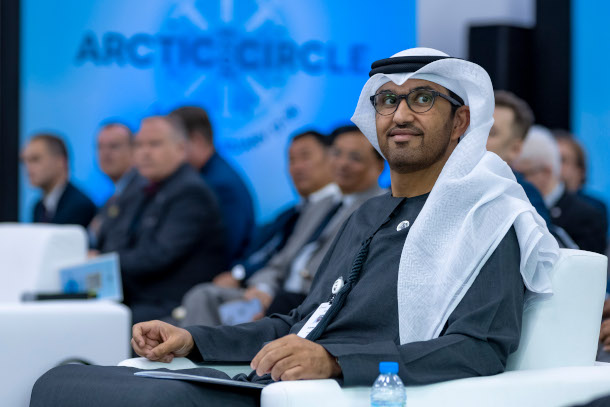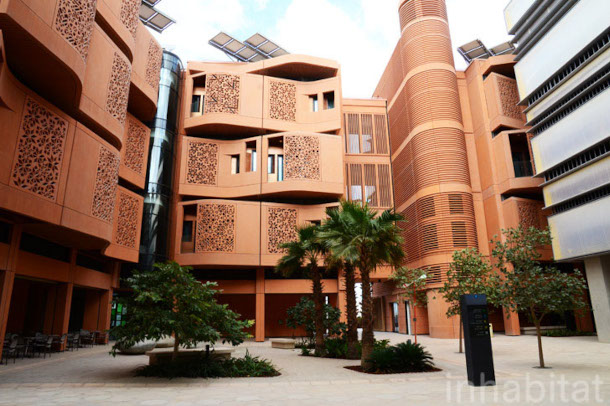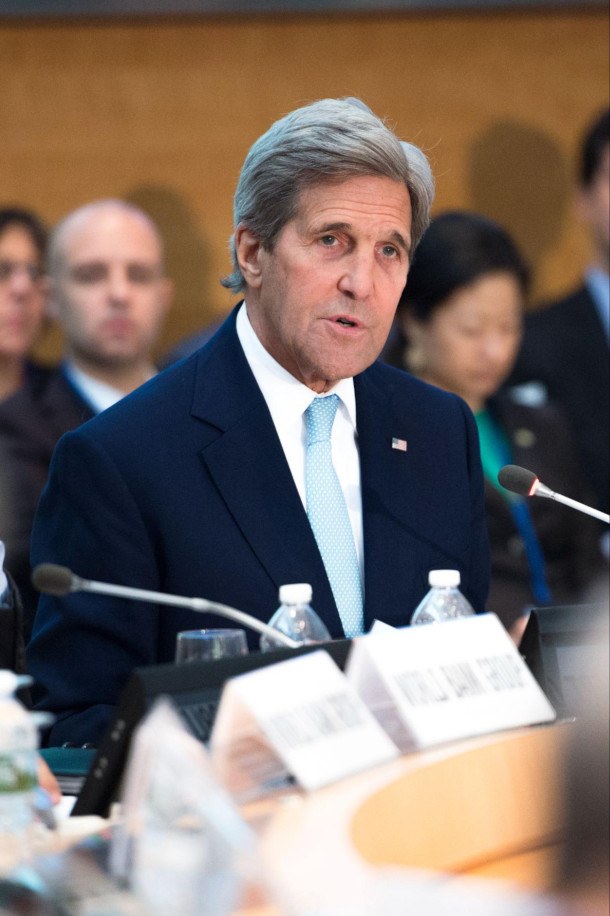Greenwashing an Oil CEO
Air Date: Week of November 10, 2023

Sultan Al Jaber, the upcoming COP28 president from the UAE, is also CEO of the state-owned oil company Abu Dhabi National Oil Company, or ADNOC. (Photo: Arctic Circle, Flickr, CC BY 2.0)
The man leading the upcoming COP28 UN climate talks in Dubai heads the United Arab Emirates’ state oil company. Sultan Al Jaber is the climate envoy for the UAE and has led the state renewable energy company, but some critics question the substance of his green credentials. Journalist Ben Stockton of the Centre for Climate Reporting wrote about this for The Intercept and joins Host Jenni Doering to describe the long-term public relations campaign to green Al Jaber’s image and install an oil CEO at the heart of the UN climate process.
Transcript
O’NEILL: From PRX and the Jennifer and Ted Stanley Studios at the University of Massachusetts, Boston this is Living on Earth. I’m Aynsley
DOERING: And I’m Jenni Doering.
So Aynsley, you know that saying “if you find yourself in a hole…
O’NEILL: …then you should stop digging,” right.
DOERING: Exactly.
But the world is continuing to dig and drill to extract coal, oil, and gas at the very moment that we really ought to be phasing these fossil fuels out.
That’s the essence of a new report from the United Nations Environment Program and partners that finds that countries are planning to produce double the fossil fuels in 2030 than would be consistent with the Paris Agreement goal to limit warming to 1.5 degrees Celsius.
The 2023 Production Gap Report noted that major producing countries have put forth ambitious pledges to achieve net-zero emissions, but they’re moving in the other direction when it comes to fossil fuel production and use.
Countries are on track to produce nearly 5 times the amount of coal and nearly double the gas than would be compatible with the Paris goal.
At the launch of the production gap report on November 8th, steering committee member Andrea Guerrero Garcia reflected on the obstacles to changing course in countries like her native Colombia, which is rich in coal.
GUERRERO GARCIA: It kind of keeps me up at night, to be honest because the challenge in front of us is very, very big. We have to first have the political will, and some of these countries, including my own, now have expressed the political will, but they need the support as well to do this.
So while we seem to have come a long way from outright opposition to change, actually making the shift is much harder.
O’NEILL: Well Jenni, I know there’s a lot of interest from governments and private industry in carbon capture and storage, which would theoretically collect the emissions from fossil fuels before they can warm up the planet.
What did the report say about that?
DOERING: Yeah, this was a pretty important takeaway from the report.
The authors said that because of all the uncertainty about whether carbon capture and storage technology would actually work, countries can’t count on it and should still plan to phase out coal use by 2040, and cut most oil and gas use by 2050. Responding to the report in a statement, UN Secretary-General Antonio Guterres said, “We cannot address climate catastrophe without tackling its root cause: fossil fuel dependence. COP28 must send a clear signal that the fossil fuel age is out of gas – that its end is inevitable.” And Aynsley, as you know COP28 will take place this year in the oil-rich United Arab Emirates.
O’NEILL: Right, we’ve covered the outcry from climate activists over the fact that the head of the state oil company is also the COP28 President.
DOERING: Yes, Sultan Al Jaber is the CEO of Abu Dhabi National Oil Company or “Adnoc” and to some that role should disqualify him from leading a UN process that’s trying to avert the climate crisis.
For others like US climate envoy John Kerry that’s actually a plus and means that Al Jaber is uniquely positioned to bridge the gap between the fossil fuel industry and a new green economy.
Sultan Al Jaber is himself the climate envoy for the UAE and has also led the state-owned renewable energy company Masdar.

Plans for the futuristic eco-friendly Masdar City outside Abu Dhabi have been scaled down and pushed back over the years. (Photo: Inhabitat, Flickr, CC BY-NC-ND 2.0)
His critics question the substance of these green credentials and are appalled that an oil executive now sits at the very heart of the United Nations climate process, a paradox that’s attracted the attention of the online publication The Intercept.
Ben Stockton is a freelance investigative journalist with the Centre for Climate Reporting who wrote about this for The Intercept and he joined me to explain.
STOCKTON: This has been a years long campaign to really build his reputation on the international stage, make him a legitimate person to be able to do that. You know, his work on climate issues goes back to the mid 2000s. He began at Masdar in 2006, the state owned renewables company. And then, after almost a decade of doing that, he then moved on to become the CEO of ADNOC. And while he's been at ADNOC we've really seen the messaging change, their kind of public messaging certainly change around their role in helping abate climate change. So for example, we've seen a lot more messaging from ADNOC around the fact that they are one of the least carbon intensive oil companies in the world. And that is something that is really a marked shift from how they were communicating in the past.
DOERING: So what strategies has Al Jaber used to shape that image over the past few decades?
STOCKTON: I think the real key to the change in that communication at ADNOC and how Al Jaber has presented himself on the world stage over the last 15 years has really been the role of PR agencies and political strategists and these big public figures who have endorsed him. And there are probably no more important PR agencies than Edelman, the kind of biggest American PR firm, certainly one of the most influential, and a company that continues to be involved in COP28. And they have done work with Al Jaber over the course of the last 15 plus years to really improve his international standing. If we go back to the mid 2000s when Al Jaber first started working with Edelman, a key task that he set for them was really engaging thought leaders. And a remarkable incident in their kind of early work was actually getting then President George Bush to come have a look at plans for Masdar City, which was this great eco city that was set to be built just outside of Abu Dhabi, that Al Jaber was promoting as the next big thing in sustainability. And Bush heaped praise on not only Masdar but also the UAE. And that's really been a key part of Edelman's work for Al Jaber is really legitimizing him on the world stage and his green credentials. He then went on to testify in front of Congress, and there was congresspeople who, again, were very complimentary of the UAE's work around climate change and its investment in renewables. And so it's really interesting that he seems to have courted these figures on the world stage over the years continuing to today where he has this remarkable relationship with John Kerry. Kerry has met with Al Jaber seemingly more than any other foreign official over the last two years since he became US climate envoy. And so in the kind of days after Al Jaber was announced as COP28 president and there was understandably a lot of anger among climate activists, that here was this CEO of a major oil company appointed to kind of one of the most important UN climate summits, John Kerry was one of the first people to come out and say, actually, and I think the words that he used was a "terrific choice" to be a COP president. And we've seen multiple people come out very vocally in support of his presidency, who again, have various ties or relationships to Al Jaber. And that's really been the culmination of this 15 years of work of really building his profile on the international stage to make sure that there was people around him, I think, when his COP presidency was announced to really defend him.

Edelman, one of the largest PR firms in the US, has worked with Sultan Al Jaber since the early 2000s. (Photo: David Armano, Flickr, CC BY 2.0)
DOERING: So why are some climate leaders like John Kerry touting Al Jaber as a "terrific choice" for the COP presidency?
STOCKTON: I think it's the fact that Al Jaber kind of has one foot in each camp. He is climate envoy at the end of the day, but he is also the CEO of ADNOC, a major oil company. And there is a thinking within some circles, that you really need to bring the oil and gas industry to the table, get them on board, and that's how meaningful change is going to be generated. I think the concern from the other side is that this is actually being used kind of cloak and dagger to be able to thwart negotiations at the conference and limit any meaningful outcomes. And really, whether that actually comes to fruition or not, is yet to be seen. But Al Jaber is really seen as this person who can bridge those two camps and Kerry is certainly of the feeling that he could really be instrumental in bringing along the industry.
DOERING: Tell me more please about the Masdar City plans that he was involved in, and what's come of that?
STOCKTON: Well, not as much as they promised, as it turns out. So it was in the kind of late 2000s, when Al Jaber and Masdar unveiled these plans for a kind of eco-futuristic city and it was going to be carbon neutral and car-free. And it was going to house tens of thousands of people, and it was going to be this blueprint for sustainable city living. On the face of it, it was astonishing, but actually, slowly over time, the deadlines for completion have been pushed back, the promises had been scaled down, and now it was supposed to be on six square kilometers, they've only built two square kilometers today. It was supposed to house something like 40,000 people, and only 15,000 people live and work there now. And the car-free transport system has been scaled back. And so that has really not come to fruition in the way that it was promised, certainly in those early days.
DOERING: So fossil fuel companies, including ADNOC, the state owned oil company in the United Arab Emirates, claim that they're committed to a transition to clean energy. To what degree have they delivered on those promises so far?
STOCKTON: Well ADNOC is an interesting one, because they do have long term net zero goals. And they actually recently brought forward their 2050 net zero target to 2045, which would suggest that they're moving in the right direction, at least. And as I said, Al Jaber has really promoted the fact that ADNOC is the least carbon intensive oil company in the world, or at least among them. And so they have these targets in place. And a lot of those targets are going to be met with technologies like carbon capture, which has obviously yet to be fully proven on a widespread commercial level scale. But actually, interestingly, while they're saying that they've got these net zero 2045 goals, actually, in the short term, they're massively ramping up production capacity. And they actually even brought forward their production capacity increases that were set for 2030 recently to 2027. So actually, it seems like they're ramping up even quicker than they previously had aimed to do. And I think that's really off the back of some of the energy security issues that have been brought about by the war in Ukraine. And so they're really kind of seemingly looking to capitalize on that, and really cash in a moment where there seems to be a high demand for oil.

US climate envoy and former US Secretary of State John Kerry says Sultan Al Jaber is a “terrific choice” for COP28 president and will be able to bridge the gap between the fossil fuel industry and climate activists. (Photo: World Bank Photo Collection, Flickr, CC BY-NC-ND 2.0)
DOERING: Ben, you report that some of the lines have actually been blurred between ADNOC, the state oil company Al Jaber runs, and the COP planning process. What's happened there?
STOCKTON: So I think some of the concern about COP28 is not just singled around Al Jaber's appointment as COP28 president and his role at ADNOC alongside that. It's also how that conflict seems to have filtered down further into the organization. So one of the early stories that we did was looking at actually how individuals from ADNOC had been moved over to work on COP28. Some of those had even been seconded. So they seemingly had some ongoing role ADNOC and were working on COP28. And recently, we reported on the fact that one of Al Jaber's key comms people at ADNOC, Oliver Phillips, is also now working on COP28. And he has really been seemingly quite crucial in steering some of these PR strategies that we've been seeing with COP, and for a long time he was seemingly employed by the oil company.
DOERING: So where does all this leave Sultan Al Jaber, and the United Arab Emirates going into COP28?
STOCKTON: Well one of the internal documents that we've seen from the climate envoy laid out some of the objectives for the UAE in COP28. And they really wanted to position Al Jaber as a "consensus enabler" and a "climate action leader." And it's really kind of yet to be seen whether he is going to be able to find that consensus, and that consensus really being between the climate activists or the more progressive climate folks and the oil and gas industry who are looking for more kind of pragmatic solutions to the climate crisis. But really, ultimately, it also leaves Al Jaber in charge of one of the most important international climate forums. The presidency is supposed to be impartial, it's supposed to be neutral. And I think it's clear now that the fossil fuel industry, even though it has sent lobbyists and delegates by the boatload to previous COPs, is now closer than ever to the head of one of these summits.
DOERING: Ben Stockton is a freelance investigative journalist who reports with the Centre for Climate reporting. Thank you so much, Ben.
STOCKTON: Thanks for having me.
DOERING: We reached out to the COP28 team for comment and did not receive a response in time for this broadcast, but during his reporting for the Intercept, Ben Stockton was able to reach COP28 spokesperson Alan VanderMolen.
In response to the COP staff’s alleged ties to UAE oil company Adnoc, VanderMolen said, “The COP28 presidency has its own independent office, staff, and a standalone IT system. The COP28 staff are separate from any other entity and operate in coordination with the UNFCCC.”
He also maintained that Sultan Al Jaber is a good choice for the role of COP president, saying, “It is in our common interest to have someone with deep experience across the entire energy value chain in this role.
His experience as a climate diplomat, serving two terms as the UAE’s climate envoy and attending over 10 previous COPs, makes him ideally suited to lead a consensus-driven process.”
Links
Read Ben Stockton and Amy Westervelt’s article in The Intercept
Living on Earth wants to hear from you!
Living on Earth
62 Calef Highway, Suite 212
Lee, NH 03861
Telephone: 617-287-4121
E-mail: comments@loe.org
Newsletter [Click here]
Donate to Living on Earth!
Living on Earth is an independent media program and relies entirely on contributions from listeners and institutions supporting public service. Please donate now to preserve an independent environmental voice.
NewsletterLiving on Earth offers a weekly delivery of the show's rundown to your mailbox. Sign up for our newsletter today!
 Sailors For The Sea: Be the change you want to sea.
Sailors For The Sea: Be the change you want to sea.
 The Grantham Foundation for the Protection of the Environment: Committed to protecting and improving the health of the global environment.
The Grantham Foundation for the Protection of the Environment: Committed to protecting and improving the health of the global environment.
 Contribute to Living on Earth and receive, as our gift to you, an archival print of one of Mark Seth Lender's extraordinary wildlife photographs. Follow the link to see Mark's current collection of photographs.
Contribute to Living on Earth and receive, as our gift to you, an archival print of one of Mark Seth Lender's extraordinary wildlife photographs. Follow the link to see Mark's current collection of photographs.
 Buy a signed copy of Mark Seth Lender's book Smeagull the Seagull & support Living on Earth
Buy a signed copy of Mark Seth Lender's book Smeagull the Seagull & support Living on Earth

